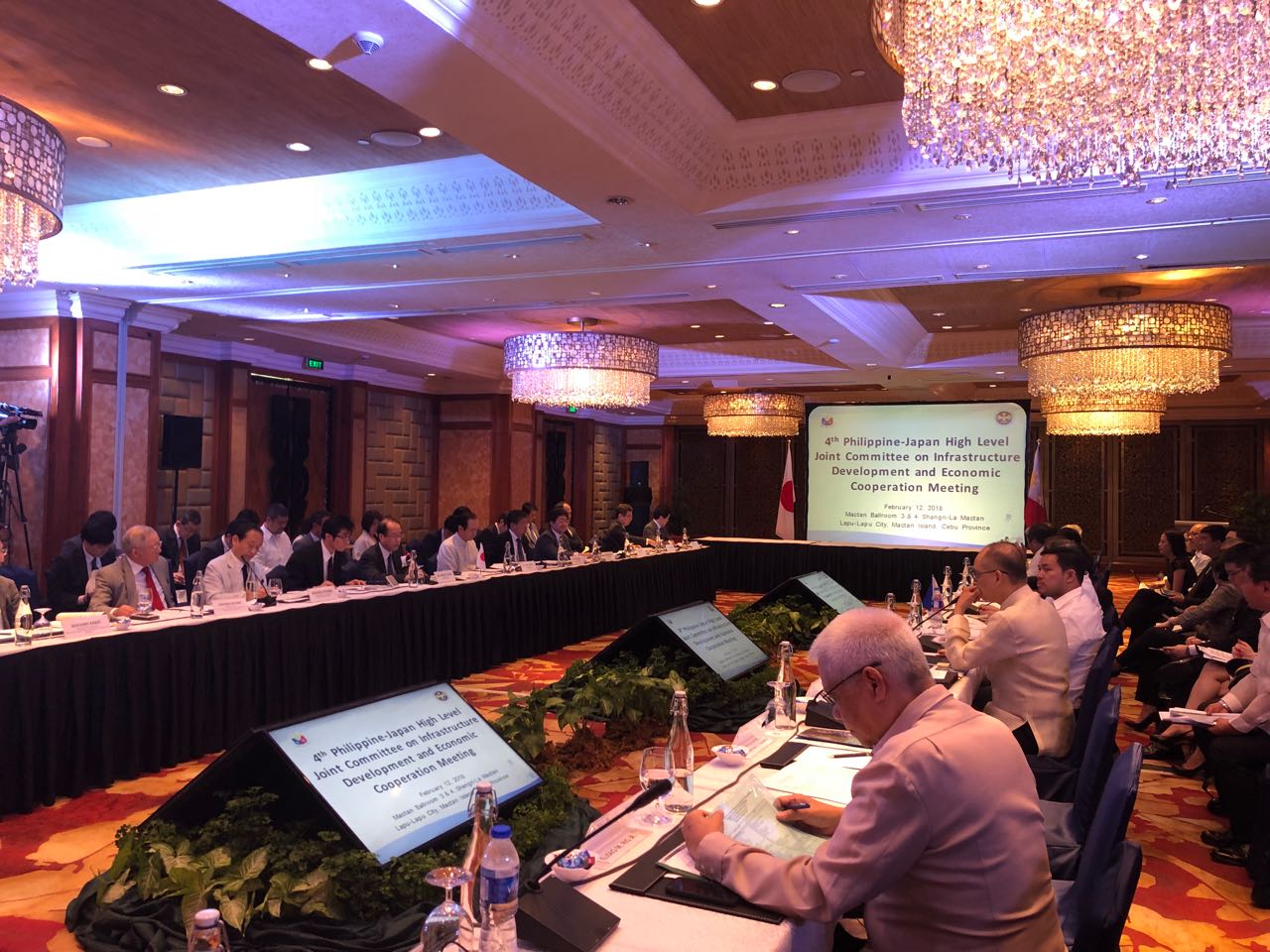
Last Monday, February 12, the Government of the Philippines (GPH) and the Government of Japan (GOJ) met at the Mactan Shangri-La in Mactan Island, Cebu to discuss the progress of the Duterte Administration’s “Build Build Build” campaign among other aspects of economic cooperation. The said meeting was the fourth high-level discussion between the GPH and the GOJ since the first dialog was held in Tokyo, Japan on March 2017.
Both sides affirmed their commitment to streamline the approval process for infrastructure projects in the pipeline for Japanese loan and grant financing. The measures agreed upon are intended to fast track the implementation of the said infrastructure projects, ensuring “shovels on the ground” at the soonest possible time.
Some of the major projects discussed in the meeting include: the Metro Manila Subway Project, with the first tranche of the loan due for signing in March 2018; the Arterial Road Bypass Project (Phase III); the PNR North 2, spanning from Malolos to Clark; the PNR South Commuter, which runs from Manila to Los Banos; the Davao City Waste-to-Energy Project; the Pasig-Marikina Travel Improvement Project; and the MRT-3 Rehabilitation and Improvement Project.
Beyond infrastructure, the Japanese delegation also expressed its support for the Marawi rehabilitation efforts and the overall pursuit of peace and development in Mindanao. In fact, the Japanese government is set to deliver heavy machinery to aid in the Marawi reconstruction efforts in March 2018.
DBM efforts to support Build Build Build
For his part, Department Budget and Management (DBM) Secretary Benjamin E. Diokno assured the timely implementation and disbursement of funds to fulfill the “Build Build Build” program. “From January to November 2017, infrastructure and other capital disbursements have amounted to P486.5 billion, a 14.2 percent year-on-year increase,” the Budget chief said.
“We are optimistic that the full-year data will validate our projections of a sharp rise in infrastructure spending for 2017, as well as minimizing government underspending,” Sec. Diokno added.
The improved performance of government disbursements can be attributed to the reforms implemented under the watch of Sec. Diokno. For one, the Implementing Rules and Regulations (IRR) of the Government Procurement Reform Act had been revised to streamline public procurement without sacrificing the integrity of the process.
The Budget and Treasury Management System (BTMS), a financial management information system, is also being rolled out and will continue to enhance budget preparation, execution, oversight, and reporting.
Policy wise, the DBM has continued the early release of allotments and the conduct of early procurement activities,enabling agencies to immediately implement projects at the start of the fiscal year. Moving forward, the shift to a one-year cash-based Budget starting in 2019 will further quicken government spending.
The DBM has also hiked the budget for Right-of-Way (ROW) payments for big-ticket items. This is intended to reduce bottlenecks in the implementation of infrastructure projects. The combined ROW allocation for the DPWH and DOTr has surged from P4.2 billion in the 2015 GAA to P32.6 billion in the 2017 GAA. In the 2018 GAA, this is even higher at P34.9 billion with the DPWH and DOTr receiving P20.5 billion and 14.4 billion, respectively.
“These indicators, combined with improved capacity to implement by line departments, will ensure that the loans extended by the Japanese government will be utilized to the fullest extent,” he said.
Under the term of President Duterte, P8 to P9 trillion will be spent on public infrastructure, ushering in the Golden Age of Infrastructure in the Philippines. The heavy investments on infrastructure will put the infrastructure budget at 5.4% of Gross Domestic Product (GDP) in 2017 up to 7.3% of GDP in 2022.
The Philippine delegation was headed by the Duterte Cabinet’s economic managers, namely Finance Secretary Carlos Dominguez, Budget Secretary Benjamin Diokno, and Socioeconomic Planning Secretary Ernesto Pernia. The infrastructure secretaries were also present for the Philippine delegation, primarily Transportation Secretary Arthur P. Tugade, Public Works Secretary Mark A. Villar, Information and Communications Technology Secretary Eliseo Rio, Jr., and Bases Conversion and Development Authority (BCDA) President Vivencio Dizon.
Dr. Hirohito Izumi, Special Advisor to Prime Minister Shinzo Abe, led the Japanese delegation. He was joined by senior officials from various ministries, including the Ministry of Finance and the Ministry of Economy, Trade and Industry. Representatives of the Japan International Cooperation Agency (JICA) were also present for the Japanese side.
The fifth High-Level meeting is tentatively set on June 2018 in Japan.

